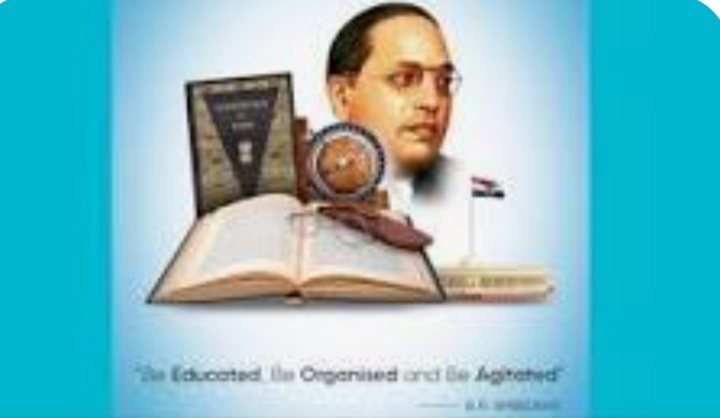Ambedkar On Education
Dr. Ambedkar is known for his view that education can bring about change and for promoting the quest of knowledge as a method of achieving both social and economic mobility. Ambedkar considered education a means to bring revolutionary social change and develop critical, emancipatory and egalitarian knowledge for a good society to evolve.
Dr Ambedkar said, “Education is what makes a person fearless, teaches him the lesson of unity, makes him aware of his rights and inspires him to struggle for his rights.” He believed that education is a movement. If it does not fulfil its objectives, it is useless.

He created a standard to pursue education to acquire knowledge and intellectual excellence. For him, intellectual or academic engagement was as crucial for professional interest or earning bread and butter as it was in seeking to use knowledge for society’s good.
The denial of education to a large section of society has had a generational impact even in the twenty-first century. In the nineteenth century, Mahatma Jotirao Phule and his wife Savitribai declared that education itself was a weapon to fight the Brahminical monopoly over education.
Ambedkar On Intellectuals
In his classic book Annihilation of Caste, responding to the work of upper caste leaders and organisations, Ambedkar raised basic questions like who is an intellectual, why is the intellectual class not interested in the question of caste and why do they never consider caste as a social or national problem.
According to Ambedkar, the intellectual class is the most influential, if not the governing class, in any country. The intellectual class could foresee, advise and lead the country, whose destiny depended on it. If the intellectual class is dishonest and indifferent to the plight of the rest of the society, it can’t be helpful when the society is in crisis.
Intellectualism without virtue is meaningless. A knowledgeable person without morality is dangerous. “An intellectual could be a good man but easily be a rogue,” he writes. Likewise, “an intellectual community may be a band of high-souled persons, ready to help, ready to emancipate erring humanity or it may easily be a gang of crooks or body of advocates of the narrow clique from which it draws its support.”
However, today, so called many intellectuals are catering to interest of powerful and rich. instead of targeting ruling class, they are targeting critics and oppositions.
Ambedkar On Women
His paper on Castes in India outlines how atrocities on women are entrenched in the caste system and condemned sati, child marriage, and the condemnation of widow remarriage. Ambedkar advocated for equal participation of women in both personal and professional spheres. He is the first to raise his voice against the unequal treatment of women in factories and other workplaces.
He was instrumental in reducing working hours and improving working conditions for women. He drafted legislation such as the Mines Maternity Benefit Act, which demanded equal pay and equal rights for coal mine workers. He ensured that the question of maternity leave for women was brought up and they were protected under labour laws.
He was a strong believer of it and urged them to make their own choices about conception. Since they were typically belonged to Dalit he was against devadasi system. In 1938, Ambedkar as a Legislative Assembly member of Bombay, recommended that birth control facilities be made available to women.
Ambedkar on Marxism and Buddhism
B.R. Ambedkar was born eight years after Karl Marx died. And it was 88 years after Marx’s seminal work, The Communist Manifesto , that Ambedkar wrote Annihilation of Caste . Now if Marx could have time travelled to the 20th century and had a one-on-one dialogue with Ambedkar, it would make for a stirring debate.
According to noted journalist N Ram, he delved into the Marxist classics… but was not persuaded either by the revolutionary theory or the practice. He was emphatically opposed to Gandhism and to the Congress ideology, although on some social issues he shared common points with Jawaharlal Nehru—who let down his Minister of Law on the Hindu Code Bill in the early 1950s.
. Politically moderate, he tended towards radicalism and uncompromising struggle in the social arena. His lifelong concern with religion, morality and justice in the idealistic sense was marked by a restlessly serious attempt to get the intellectual, social and political measure of these things. He did not believe in class analysis, but intuitively and intellectually grasped the link between caste.
Both Dr. Babasaheb Ambedkar and Karl Marx had a strong belief in the concept of social justice and equality. They both opposed the caste and class-based discrimination that was prevalent during their times. Both believed in the need for a revolution to bring about the necessary changes in society. Both were advocates of workers’ rights and believed that the means of production should be in the hands of workers.
However Karl Marx was primarily concerned with economic and class-based inequalities, whereas Ambedkar was concerned with social and caste-based inequalities.Marx believed that socialism was the solution to the problems of capitalism, while Ambedkar believed in liberal democracy and the need for political empowerment of marginalized groups.
The Buddha and Marx may have sought similar ends, but Ambedkar declares that the Buddhist way is far more efficacious and far more in keeping with notions of human dignity and freedom: “One has to choose between government by force and government by moral disposition.”
Ambedkar and Capitalism
As an economist, Ambedkar was not beholden to a particular school of thought or -ism. For economic growth and the upliftment of the poor, he was willing to use an idea that was needed in a given context. Ambedkar’s perspective, a capitalist economy was an enemy of liberty and social justice. Ambedkar’s advocacy of state socialism, underpinned by a desire to ensure productivity and equitable distribution of wealth, and his critique of “social welfare” capitalism, are what make him relevant to dissenters all over the country today. He wrote in States and Minorities: What are their Rights and how to Secure them in the Constitution of Free India, published in 1947: “Private enterprise [in India] … would produce those inequalities of wealth which private capitalism has produced in Europe”.
In the explanation of Article 2, Section 2, Clause 4, titled “Protection Against Violation of Fundamental Rights: Protection Against Economic Exploitation”, Babasaheb wrote, Anyone who studies the working of the system of social economy based on private enterprise and pursuit of personal gain will realize how it undermines, if it does not actually violate, the last two premises on which Democracy rests. How many have to relinquish their constitutional rights in order to gain their living? How many have to subject themselves to be governed by private employers? Ask those who are unemployed whether what are called Fundamental Rights are of any value to them. If a person who is unemployed is offered a choice between a job of some sort, with some sort of wages, with no fixed hours of labour and with an interdict on joining a union and the exercise of his right to freedom of speech, association, religion, etc., can there be any doubt as to what his choice will be. How can it be otherwise? The unemployed are thus compelled to relinquish their Fundamental Rights for the sake of securing the privilege to work and to subsist.
What was wrong with Ambedkar
Dr Ambedkar was one of the greatest prodigies, intellects, geniuses that world has ever produced. His fight against casteism was right but blaming Hinduism, other upper caste stringently was not absolutely correct. He failed to study the exploitative mentality of human beings which is inherent in human instinct. Had he born in higher caste family, he would not have blamed Hinduism .
The roots of the caste system go back to the ancient Vedas dividing people on the basis of varna or occupation. But today caste should be changed depending upon on one’s occupation, economic background but has not been changed by rulers . To enjoy supremacy in a given position, given realm is inherent instinct of human beings. So, beneficiaries of any system-right or wrong – do not want the termination of system.
Each human being faces discrimination, inequality from mother’s womb in different forms. Caste system is one of them which is gravely inhuman and cruel. Actually , It is just strong that exploits weak in a given circumstance. We experience gender inequality, economic inequality too. Society was status oriented and class divided and same continues to plague today.
Today, politicians, rich, bureaucrats, corporates and business behemoths represent upper caste in different structure who exploit others. Different chairs are kept in first line of meeting hall for certain powerful persons. Ministers eat poor men’ house but how many poor people eat minister’s house? Unless exploitative mentality of people changes, always discrimination will continue but in different forms.
Conclusion
Today politics is all about caste, race, religion, polarisation and mudslinging. Political narratives are crystallised in and around larger identities based on these very lines. Poetics has becomes a matter of expedience and rich people’s game. Ideology has taken a back seat in political discourses. In politics, expedience can mean making false promises or using short-term solutions to deeper problems, with the aim of getting elected (or reelected)
Parliament is merely used to propagate narrow party goals and hurling insulting words at political rivals. Leaders hardly deliver qualitative, intellectuals’ speeches; neither are they engaged in peaceful, humble and meaningful dialogues. They are obsessed with self-aggrandisement, publicity blitzkrieg and in a incessant race to stay in the power corridors so as enjoy power, prestige and publicity.
Ambedkar’s philosophy helps us to understand that humans need a universal moral standard to live in society. His intellectual pursuit entails priorities, praxis and social ethics that can orient towards an ideal of emancipation and social justice. His philosophy to ascertain freedom and equality so that fraternity could lay the foundation of a society. The idea of a good society is possible when the distinctiveness of individual is duly recognised and dignity is protected.


